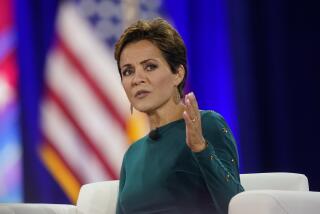An ousted pioneer explores a new trail
SAN FRANCISCO — A self-described “change warrior,” Carly Fiorina has been a law school dropout, a real estate broker, an English teacher, a telecommunications executive and the first woman to be hired, then fired, as chief executive of a Fortune 20 company.
The former Hewlett-Packard Co. CEO is again forging new territory for herself, this time in the highest ranks of American politics. She has quickly emerged as a high-level advisor to Sen. John McCain’s campaign in the Arizona Republican’s bid for the White House.
Her rise has spurred speculation that Fiorina, famous for breaking glass ceilings, is auditioning for her next act -- political office -- after the biggest disappointment of her career.
Fiorina, 53, is doing yeoman’s service for the campaign in exchange for the chance to refashion her image as a political contender. She takes part in daily strategy sessions, advises McCain on the economy and acts as his surrogate in battleground states and with women.
Not that she hasn’t had her missteps.
Her poise and freshness have been offset at times by her inexperience and her contentious tenure at HP, during which she cut more than 20,000 jobs and the venerable technology company’s stock fell by nearly half. Democrats say that Fiorina is a ripe target, viewed as an elitist who threw the company into turmoil before walking away with $21 million in severance and other payments.
On the campaign trail, a comment she made about insurers and Viagra created an embarrassing moment for McCain. In the following weeks, she showed her face less frequently in public but appeared on CBS’ “Face the Nation” on Sunday.
Her rise in politics has marked quite a comeback. In 2005, Fiorina was dismissed by HP. Three years later, she is discussed as a potential vice president.
“To be suddenly cast in the World Series is unusual,” said Chris Lehane, a Democratic political consultant. “She’s had a few moments where she has said something that has gotten her in trouble. But no one goes from having never playing baseball to getting hits.”
Political consultants say Fiorina serves several roles in shaping the candidate’s image. She “softens” McCain by trumpeting his more moderate positions. Her business resume bolsters his economic credentials. And she is a counterpoint to McCain’s image as a man’s man, championing the Republican senator as a friend to women.
“I happen to be pro-life,” Fiorina said late last month during a meeting of Georgia Women for McCain in Atlanta. “There are many women in this country who are not, and yet many of them will support John McCain.”
Fiorina has never run for public office, although politics has long been mentioned as her next act. Ever since she took the helm of Palo Alto-based HP in 1999, at the age of 44, friends and California Republicans have nudged her to run for state office. She resisted those invitations while at HP because she felt her work wasn’t finished, she wrote in her 2006 memoir, “Tough Choices.”
“She electrifies a room when she comes in, and she has an ability to inspire,” said Boris Feldman, a Silicon Valley lawyer and friend of Fiorina.
Fiorina, who declined to be interviewed for this article, met McCain in 2000 when she went to Washington to argue against Internet taxation.
She was reintroduced to him last year, and in March was named chairwoman of the Republican National Committee’s Victory ’08 panel to raise money and rally voters. In May, as the Democratic primary season was winding down and women who supported Sen. Hillary Rodham Clinton of New York appeared up for grabs, Fiorina began to appear more frequently on political talk shows and introduced McCain at events.
Her work for the campaign isn’t without risks.
During a July breakfast with reporters in Washington, Fiorina said it was incongruous that many health plans covered Viagra but not birth-control medication for women. Yet McCain had twice voted against legislation to mandate that health insurance companies cover birth control.
When asked about Fiorina’s comment, McCain appeared stumped. Planned Parenthood turned video of his hemming and hawing into a TV spot.
“She has shown herself a sort of rookie,” said Donnie Fowler, a Silicon Valley-based Democratic political strategist.
Scott Reed, a Republican strategist who ran Bob Dole’s 1996 presidential campaign, gives Fiorina high marks for her political presence but said she “tripped over the Viagra issue.”
“She has to remember she is speaking for the candidate, not herself,” he said.
In her memoir, Fiorina described a life of taking on challenges and going the least comfortable route. She dropped out of UCLA School of Law in 1976, disappointing her father, a law professor who later became a federal judge.
“I found the focus on precedent confining,” she wrote. “What about creating something new?”
Fiorina has forged her career going against precedent.
She was hired away from Lucent Technologies Inc. to shake up HP, which was founded in 1939 by William Hewlett and David Packard, and inject a sense of urgency into its paternalistic culture.
Fiorina met fierce resistance from both employees and directors, who criticized her as an overly slick marketer who didn’t understand technology or the company well. She appeared in TV commercials, and her portrait appeared in the company’s lobby next to ones of the founders, sparking howls of derision among the rank and file.
The resistance turned into a war when in 2001 Fiorina engineered a $18.9-billion merger with Compaq Computer Corp. She fought a seven-month proxy battle against the founders’ children, who wanted to stop the merger.
Fiorina won. But she struggled with the merged company’s financial performance during an economic downturn. She drew the ire of workers across the country by cutting the workforce and defending the practice of outsourcing jobs overseas. “There is no job that is America’s God-given right anymore,” she said.
That applied to her own.
HP’s stock fell 49% while she led the company, a much steeper decline than the 27% drop of the Nasdaq over the same period. In early 2005, HP’s board wanted her to hand off some oversight of the company’s daily operations. When Fiorina resisted, the board fired her.
Since Fiorina’s departure, HP’s sales, profit and stock price have taken off. Although many credit new Chief Executive Mark Hurd, Fiorina said she set the proper course.
“The company was transformed under my leadership,” Fiorina said in a 2006 interview on “60 Minutes.”
Chuck House, a former HP employee who is co-writing a corporate history, thinks Fiorina helped modernize the company and was unfairly blamed for its problems.
“It’s curious to me why she got bashed so badly,” said House, executive director of the Media X program at Stanford University, which brings together research and industry. “She has a lot of naysayers, who tend to be people who love the old HP way.”
Fiorina’s emergence on the political stage has revived debate over her HP legacy and created a backlash against the candidate by some high-tech workers. But Fiorina’s controversial tenure may make her more ready for politics than many other CEOs, who are often insulated from daily criticism, said Steve Forbes, the media magnate and two-time presidential candidate.
“She knows the treachery of internal politics from an entrenched circle,” he said.
In the three years since she left HP, Fiorina has written her memoir, worked on her charitable foundation and spent time with family (she and husband Frank Fiorina have two adult daughters from his previous marriage).
She has been “redefining and relaunching herself” for years, said George Anders, author of “Perfect Enough: Carly Fiorina and the Reinvention of Hewlett-Packard,” a book about the HP proxy fight. “Starting over with new allies is part of the adventure.”
Whether or not McCain becomes president, Fiorina may emerge a winner.
As she said in July: “One of the great things about my life right now is I have lots of options and lots of opportunities. And I have learned that if you’re open to options and opportunities, the future tends to take care of itself. So I’m not really worried about what’s next.”
--
Times staff writer Jim Puzzanghera contributed to this report.
--
(BEGIN TEXT OF INFOBOX)
Carly Fiorina
Age: 53
Residence: Los Altos Hills, Calif., and Washington, D.C.
Current position: Victory ’08 chairwoman, Republican National Committee. Economic advisor to presidential candidate John McCain.
Previous jobs: Chief executive, president and chairwoman of Hewlett-Packard Co.; president of Lucent Technologies Inc.’s global service provider business
Education: B.A., Stanford University; MBA, the University of Maryland; M.S., MIT Sloan School of Management
Author: “Tough Choices: A Memoir,” published 2006
Source: Times research
More to Read
Inside the business of entertainment
The Wide Shot brings you news, analysis and insights on everything from streaming wars to production — and what it all means for the future.
You may occasionally receive promotional content from the Los Angeles Times.









